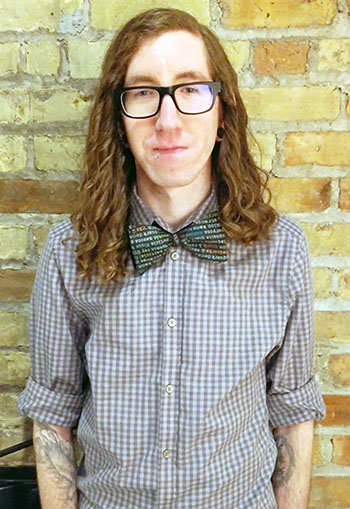As a person who struggled with poverty and homelessness growing up, aspiring science teacher Jason Garver (’20) is motivated to help students who face hardships outside the classroom that need extra support to succeed in school.

What drove you to enroll in the program?
I actually had no intention to enroll in a teacher preparation program until nearly the end of my undergraduate degree. I was pursuing a degree in astrophysics with the intention of continuing my education at the Ph.D level, but the call to teach began nagging at me as I thought about how best to apply my knowledge of physics and personal experience in the world.
I grew up in poverty and was often homeless throughout my youth, with little access or motivation to attend primary or secondary schooling. I realized after struggling to gain my footing as a young adult that I had a passion for teaching and science education; and also a unique worldview having grown up as a “troubled student.”
When I decided to pursue a career in education, I knew I wanted to enroll in a rigorous program that would provide me with a solid background in pedagogy, but also one which has a focus on social justice and equity in education. The M.Ed and teacher licensure program at the University of Minnesota stood out as a leader in preparing new teachers for the socio-cultural diversity of the classrooms found throughout Minnesota. As someone with a focus on urban science education, the expertise of the faculty members at the University of Minnesota has deepened my knowledge on social issues affecting science education and has helped prepare me to move into a classroom.
When did you realize you wanted to be a teacher?
I realized I wanted to be a teacher about halfway through my junior year of undergraduate study. I had an interest in education already, but it wasn’t until I examined my personal goals that year that I switched my focus to education and away from physics research.
What do you hope to get out of your educational experience?
The M.Ed program has a very interesting structure that utilizes the expert knowledge of their teacher candidates, allowing the program to focus on pedagogy and best practices in teaching. In this program, I hope to gain the experience required to become a leader teacher in my field, and the skills/knowledge to support students from diverse backgrounds in a high school setting. I consider myself to have “expert knowledge” of the physics content taught in high schools which allows me to use this program to focus on pedagogy and equity.
Were there any surprises and challenges along the way?
The most challenging aspect of the program thus far has been moving from theoretical education to the classroom where application of important pedagogical principles can get lost in classroom management and school culture.
I have surprised myself throughout the program. During my middle school practicum I absolutely did not think I would enjoy teaching sixth grade students, but it was one of the most fun few months of my life.
What has been your experience with the faculty?
That faculty are some of the most passionate people in their fields I’ve had the pleasure to meet. Each faculty member represents an expert in a niche; not only have they given me a solid background in their respective fields, but they have also modeled exemplary teaching practices. As a beginning teacher, learning this skill of transforming expert knowledge into understandable pieces is essential. The education-focused faculty here not only have a deep interest in pedagogy, but an obvious interest in student achievement and support.
Do you feel the coursework and student teaching will help you to begin teaching in your own classroom?,
One huge realization I had early in my student teaching was the role education theory plays into teaching and creating an equitable classroom. My classes have given me a vast and complete framework to think about and reflect on my teaching practice and the education system as a whole.
The student teaching experiences I have had are by far the most useful applications of education theory and practice I have had. As someone who infrequently attended school myself, the ability to observe and model other teachers has given me a fantastic opportunity to learn how students act, think, and behave. As I move into more independent teaching, I can apply these “street smarts” learned in the student teaching experiences with the theoretical education background to hopefully form a culturally relevant, interesting, and equitable classroom.
Any other thoughts you want to share about your experience?
As someone who had a very rough childhood with homelessness, poverty, and very little formal education I can say this program gives me a lot of good opportunities to share my experiences. I have done this through a few different ways–sharing my past in small group and class discussions and through giving lectures to my classes or to other cohorts of future educators in the program. This outlet to inform and help other teacher candidates understand my worldview and ask questions is beneficial to all of us as teachers. Understanding some of the struggles a student is dealing with can be a huge step in reaching a student on a personal level.
Find out more about the teacher education programs in the Department of Curriculum and Instruction.



